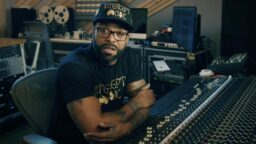If you got in touch with Ditto Music a decade ago, you might have ended up with a bouncy castle. If you get in touch with Ditto Music today, you might end up with a global hit.
The fast-growing music distribution and services company was founded in January 2007 by brothers Lee and Matt Parsons from a flat in Smethwick, Birmingham – accommodation, recalls Lee, which sat under a densely-populated apartment packed with people “smoking crack all day”.
Back then, Ditto wasn’t just a music company: Lee and Matt ran a range of businesses from their humble abode, including a window cleaning operation, a computer repair service – and a bouncy castle hiring company.
Anything, basically, to pay the rent.
“We had one mobile phone and when people called we didn’t know if they’d want window cleaning, a bouncy castle or their computer fixed,” says Lee (pictured). “So when we eventually launched the music company, we just started saying, ‘Hello Ditto’ to anyone who called the phone. That covered all bases.”
Today, following a year of accelerated worldwide expansion, the Birmingham-born, Liverpool-HQ’d Ditto is a truly independent British success story – and it’s still fully owned by the Parsons brothers.
The firm was recently named the No.48 fastest-growing company in the UK by The Sunday Times – while the same newspaper placed Ditto at No.26 in its league table of British SMEs with the fastest-growing international sales. (None of these sales, you might have guessed, were of bouncy castles.)
“We had one mobile phone and when people called we didn’t know if they’d want window cleaning, a bouncy castle or their computer fixed.”
With 19 offices around the world – in addition to an A&R presence in hip-hop hotbed Atlanta – Ditto is now truly one of the premier independent distribution/services companies worldwide.
The firm runs three offices in the US alone – in New York, Nashville and Los Angeles – where it recently pinched TuneCore’s respected Senior Director of Entertainment Relations, Chris Mooney, to head up countrywide operations from NYC.
There have also been recent office openings in the Philippines, Brazil, Argentina, South Africa, The Nordics, Mexico and India.

All of these acts, however, then jumped to major label deals in order to take their careers to the next level.
Since then, Ditto has become more tenacious about encouraging artists to remain independent, and stay the course within its system. That’s why the firm takes its expanding global presence quite so seriously – with an A&R force in every market in which it operates – and has recently bulked up the level of service it can offer artists.
It’s should be no great surprise, then, that Ditto has become a go-to distribution partner for the UK’s hottest urban music artists.
Stormzy (pictured inset) released breakthrough Top 10 single Shut Up through the company in 2015, before signing with ADA, while other leading lights such as MoStack, Hardy Caprio and MIST have also turned to the firm to boost their careers.
And today (July 19), the company took things to the next level: Ditto is now the official digital distribution partner for Chance The Rapper’s new material.
Ditto currently has around 150,000 artists on its standard distribution tier, which sees acts pay an annual subscription of £19 and keep 100% of their royalties. (Quick maths: That’s nearly £3m a year in baseline revenue.)
In 2015, Ditto started layering on additional services for its banner artists, who typically still receive 80%-90% of their royalty pool despite Ditto’s further investment in their career.
“The reason we expanded so much last year is so we can have teams in each territory going separately into the Spotifys, Apple Musics, Amazons etc. to build artists worldwide,” says Lee Parsons. “With Dave’s last release he got on the front of the Brazil Rap playlist, the US ones, on the front of the Philippines… for the small percentage the artists pay, they get a truly global campaign.”
Ditto’s recent expansion has been made possible by some smart business moves: in 2014, Ditto launched ‘Record Label In A Box’, providing independent artists with a one-stop package for grassroots labels that takes care of PPL and ISRC registration, in addition to other services. The product now turns over £2m a year.
MBUK sat down with Ditto CEO Lee Parsons to learn about his company’s ascent, its global battle with the major labels, the growing power of independence, and why the blockchain is about to change everything, for everyone…
Is it true you and Matt started off in a band and got dropped?
Yeah. My brother and I actually auditioned for [Island Records boss] Darcus Beese, when I was a rapper. That was about 13 years ago. We went through the whole industry thing – we had a management deal with Albert Samuel who had Blazin’ Squad and So Solid Crew and we signed a publishing deal with EMI. But it’s the classic story: we didn’t get to put any music out.
“The whole Ditto thing started from us trying to release our own songs. I went down to HMV, waited an hour to speak to a woman and asked if we could get our CD in the shop and she literally laughed at us and said there was no chance.”
Me and Matt went back home to where we lived, Smethwick, and we were frustrated by it all. The whole Ditto thing started from us trying to release our own songs. I went down to HMV that Christmas; I waited an hour to speak to a woman and asked if we could get our CD in the shop and she literally laughed at us and said there was no chance.
You literally went to your local HMV?
Yes, the one in Birmingham. We even made business cards in the library to make it seem like we had a proper record label, but she [the HMV manager] still said no. People don’t understand now how hard it was back then [circa 2005].
There was one record label down the road from us, and I told them: ‘We’ll give you £200 if you just put our CD into HMV.’ We had a decent fanbase, but they said no and laughed at us. One of the people from that record label applied for a job at Ditto a few years ago, actually…
What happened after you were rejected?
Six months later, we found out about this company called Wippet, who were like the first digital store – they were ahead of their time. We put our track on there and were really excited, only for it to get to, like, No.72 in the UK charts.
“We’d been in bands for so long and we were physically exhausted. We were living in Smethwick in this horrible flat with people smoking crack upstairs all day.”
We’d had enough, me and my brother. We’d been in bands for so long and we were physically exhausted. We were living in Smethwick in this horrible flat with people smoking crack upstairs all day.
I was doing window cleaning, and my brother was fixing people’s computers. I had a bouncy castle as well so I was renting that out for kids’ parties on the weekend. Anything to make a bit of money.
That was 2006, but by 2007 you’d had your first Top 40 single…
We’d found this band, Koopa, who’d built up a pretty good fanbase. We explained to them that we thought we could get them into the charts. This was around September [2006], and we put them on pre-order from then until the second week of January [2007] – because we’d learned that was the quietest release week in the industry, back when CDs were prevalent.
We’d also worked out something important: they allowed SIM card purchases [in the UK chart] back then, but they didn’t actually check if the user downloads the track. So we bought a load of SIM cards off eBay – you could buy them for £2:50 each with £5 of credit on them. We’d buy the song three times on each SIM for £4:50 with the £5 credit, and we’d get three pounds back [from the sale as the record label]. So we get three chart sales, and earn 50p back each time.
Me and Matt were sitting in this little council flat downloading this track off these SIM cards, with our mum helping us. It was mad. And then, in the second week of January [2007], we had a phone call at 8 o’clock on the Monday morning. I assumed it was for a bouncy castle. But it was a guy saying, ‘What’s Ditto Music? You’ve got a song No.12 in the midweek charts.’ It was unbelievable.
That track ended up at No.32 in the same week the OCC changed its rules so you didn’t need a CD sale for chart inclusion, right?
Yes, it was crazy. Radio 1 came round to our flat, the BBC [news] came round. I remember a journalist in our flat holding up a USB stick on the 6 o’clock news and calling it an MP3 player – no-one seemed to understand what was happening [to the music industry].
“we became known as ‘the digital company’, when the majors were still obsessed with the CD. if it was up to the labels, not Spotify and Apple etc., the industry would still be based on Compact Discs!”
We were thrust into quite a lot of industry attention, and we became known as ‘the digital company’, when the majors were still obsessed with the CD. The labels are all congratulating themselves on having the best year ever now, but it makes me laugh; if it was up to the labels, not Spotify and Apple etc., the industry would still be based on Compact Discs!
Because we were in the press so much, all these artists started coming to us. We moved into an office, took on staff and started building Ditto into what we wanted it to be – a record label that was fair to artists and which offered them all the tools we never had.
Why do you think the calibre of artists you’ve worked with in recent years – Dave, Stormzy etc. – came to Ditto?
What it really comes down to is that our staff are always at shows and doing real A&R work for artists. When Stormzy came through, we were there; we’ve had Dave since he released his first song and did his first freestyle – we’re very active in that scene.
People come to us because they trust us, they know we’re real fans and they know we’re going to do a good job. It sounds really easy, and in a way it is; in my experience, major labels don’t want to do that [grass roots A&R] – they’re more interested in short-term market share gain, and that means getting involved later in the cycle.
“People come to us because they trust us, they know we’re real fans and they know we’re going to do a good job.”
When Stormzy blew up a bit, they came in with a bunch of money, but the hard work had already been done by Stormzy and his team.
How do you combat the ability of larger companies to come in and offer big cheques to artists you’ve helped build? Are you seeing that pattern changing?
It’s sometimes hard to compete because we haven’t taken VC investment. We do give advances to artists – good, sustainable advances. But we’re about the long-term. We’re not going to go in and fight for market share if someone’s going to give an artist a million pound deal which they know they’re not going to get back, and that happens all the time, even amongst our distribution competitors. People at the majors sometimes prioritise market share over getting an actual return.

We’ve taken on radio staff and PR staff in London and we’re building out that team – and we’re entering into longer-term deals with artists with options on them. Major labels don’t want to offer 80% [royalty] deals to artists! If they could, they’d be signing 20% deals every time. You find any artists from the ‘90s who still have any money left or are still getting cheques [after recouping] – they are very thin on the ground, and I have friends in that situation.
“We do give advances to artists – But we’re about the long-term. We’re not going to go in and fight for market share if someone’s going to give an artist a million pound deal which they know they’re not going to get back.”
[The deals at majors] have got fairer because of companies like us; now they have to compete with us. The work we do speaks for itself. We always have about five or six tracks on New Music Friday in each territory. There definitely is still that very wrong idea that Universal or Warner or whoever can do things Ditto can’t because we’re smaller. But it’s a long-term thing and eventually more and more people will realise what we can do for their career globally.
Is it particularly hard to compete when the majors are swimming in the cash they’re currently earning from streaming?
I can’t mention any artists’ names, but if you take away Stormzy – and when he left us he was already a huge success thanks to the work he put in with his team – I’d say 50% to 60% of people who leave Ditto and go to labels come back to us.
A lot of artists end up frustrated after they sign those major deals, because they sign away some or all of their independence. I’ve travelled around the world this year and taken on a lot of people from the majors, and I believe those frustrations will always exist.
Why haven’t you taken on VC money?
I never even knew what a VC was until five years ago. When we started Ditto, we just wanted to make £50 a week to go to the studio, then when we started building it up we just wanted a business that was profitable.
As soon as you take on VC money everything changes. 90% of people in major labels are really smart people, but they have so much hassle from the people above them – which all feeds down from the shareholders – as to what they can and can’t do. I don’t want to be told what I can and can’t do. I want to be able to sit with an artist and talk about what they want to achieve and how they want to achieve it, and I want that to be a creative discussion.
Whether we’ll [take on VC money] at some point, I don’t know. As I say, at the moment, literally two or three people a week will contact us about [potential investment] and that’s been the case for three years now. We’re very profitable so it’s a short-term thing to take on VC money; it gets you to a point a lot quicker than you would have done it without it.
I’ve been doing this 12 years and it’s been a long, long 12 years. But now we’ve slogged it out for all that time, and got through the painful periods, it would have to be a huge thing for me to [sell equity in Ditto] right now.
Have you had major label acquisition interest?
Yes. Of course our competitors have tried to buy us – that’s no surprise. And labels have sniffed around, offering us money for [upstream deals].
“Universal and Warner have built similar platforms as Ditto, but they’re not as successful because their primary reason for doing it is to get the data.”
Universal and Warner have built similar platforms as Ditto [Spinnup and Level Music], but they’re not as successful because their primary reason for doing it is to get the data; it’s not about music, it’s about avoiding doing A&R work. We’re doing it for the right reasons; people know how passionate we are about it.
Let’s talk about the UK singles chart. Since Ministry Of Sound was bought by Sony, independent Top 40 singles are almost non-existent… except for Ditto. What’s going on there?
More people, especially in the hip-hop world, aren’t signing deals. Young Bane goes through Disturbing London, who went through us [before a recently-signed Parlophone JV]. Dave’s done really well; AJ Tracey’s done really well.
Every country is very different. When I go to the Philippines, artists aren’t really allowed to say they’re on a label, not being independent is very unfashionable. But in Australia, it’s the opposite – being on a label is still a huge thing for artists.
In the UK, all the artists coming through now understand what’s gone before them and that they don’t need to sign a deal; you can keep your rights and get a similar level of service. There’s a particularly big awareness about that amongst the grime and hip-hop artists here. They tend to be very business-savvy.
Do you like hearing Daniel Ek say he wants to break down the gatekeepers of the music business?
[Laughs] Funnily enough, maybe not – if he means us! I don’t think Daniel Ek wants to do 3,000 support tickets every day because someone’s metadata’s wrong. I don’t think anyone understands how hard distribution and services is – how labour-intensive it is to do it properly.
That’s a big topic: when will Spotify, Apple or anyone ‘do a SoundCloud’ and allow artists to upload direct. Spotify talks a lot at the minute about a ‘two-sided marketplace’ and that sounds like SoundCloud to me. Is that a threat to you?
It is and it isn’t. So long as you want to be on all the services and get a level of expertise across all of them, as well as things like radio and press, you will always need a [third-party] partner.
We manually listen to every single piece of music that comes through our door. Long-term, we feel like we’re a record label moving with the times, and that means staying ahead of what’s going on.
That includes blockchain, in which you’ve invested. what’s happening there?
I was in the Philippines doing a launch in September last year, and obviously I’d read about blockchain a lot before then. Jonathan Ong, a really successful Filipino music producer who’d been investing in bitcoin in 2013 for $80 and had bought a bunch of houses [with the proceeds], sat me down for two days and explained the whole thing to me.
I called my brother and just said to him, ‘Listen man, we have to do something about this otherwise we’re absolutely screwed – it could take away what we do when everything becomes decentralised.’ So then we started thinking, How can we add to what’s going on – how can we make the landscape better by using blockchain?
In what way could blockchain change everything?
If Spotify wanted to do instant automated payments to artists via the blockchain, they could. I’m sure they’re designing things using blockchain now.
Music will be completely decentralised. It will remove any middle-men, thereby benefitting the artists by increasing their revenue share. This is exactly what Ditto aims to accomplish. Blockchain will revolutionise the music industry and we want to be a part of that innovation.
“If Spotify wanted to do instant automated payments to artists via the blockchain, they could. Blockchain will revolutionise the music industry and we want to be a part of that innovation.”
If you go to a country like Brazil today, it’s a well-known fact that people don’t really get paid via radio play. It’s rather endemic – the money goes back to people who shouldn’t get it. Even in the UK, there’s an issue around the amount of [public performance] money which goes back to the majors because it doesn’t get claimed by the rightful owners.
Due to the nature of the blockchain, tracking data and information becomes much easier. There is zero tolerance for human error. It’s completely accurate.
With blockchain, every transaction a song goes through, from the time it gets uploaded will be recorded on an open ledger – it’s completely transparent. It means no one can cook the books. Traditionally this is something major labels fear, but transparency is something we have always championed. We believe in artists’ rights to fair compensation.
Also, I’m excited by the idea of token-ising artists. I think over the next year you’ll see artists becoming their own tokens; and people directly investing into an artist as they would buy into an ICO (Initial Coin Offering). We want to help artists do that.
This will bring artists and their followers even closer together and that would not be possible without blockchain’s smart contract capabilities.
What does that mean in real terms?
Imagine if Ed Sheeran was token-ised at the start of his career; you saw him at a gig and you bought his tokens like you would a CD. The value of that token would probably be up about 10,000% now. If you find an artist you like, and you put £100 in, then they get to an Ed Sheeran level, you’re going to be rich.
With that model comes the possibility that more people will be interested to go to gigs again, and more people will be interested in discovering new artists. It’s a long-term play.
It’s going to democratise A&R investment for everyone?
Exactly.
What does good A&R mean to you?
Good A&R means being first on everything, spending 99% of your time in the studio or at gigs. It’s not enough to follow data, you need to be there way before that. We listen to every single piece of music that comes through Ditto before it even gets on Spotify.
And if something sounds really good the rest of the office will listen to it and we’ll discuss it. But most of our music still comes from managers and people who are recommending to us.
What’s your ambition for the future of Ditto?
About 18 months ago, we thought, let’s make a play to properly take on the major labels around the world. It sounded ridiculous because we only had three offices at that time. But over the last 12 months we’ve shown we can be a threat to what the major labels are doing with their [‘indie’] distribution arms; in the Philippines, we have literally 90% of the biggest bands on our books with a brilliant A&R guy, Jinno Minna.
“over the last 12 months we’ve shown we can be a threat to what the major labels are doing with their [‘indie’] distribution arms; in the Philippines, we have literally 90% of the biggest bands on our books.”
What we’ve done recently in the UK, building out the team with proper radio and PR support for artists, in addition to the streaming support – that’s what we want to do now in the different territories. We’re going to start going after the biggest artists in the world.
All the majors fret about market share, but we’re not interested in that game – we just want to know who’s got the next Adele coming through. That’s where we can compete. We want to be the best, not the biggest, music company in the world. And I really believe that’s what we can become.
MBUK is available via an annual subscription through here.
All physical subscribers will receive a complimentary digital edition with each issue.Music Business Worldwide






